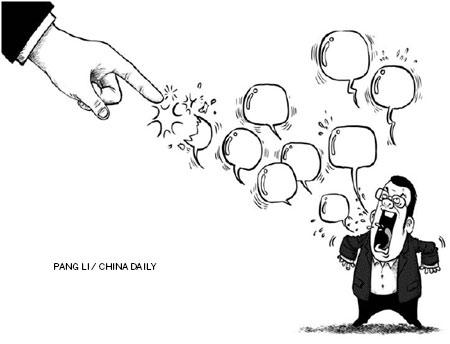Xi offers hope of clarity
Updated: 2012-12-04 08:01
By Colin Speakman (China Daily)
|
||||||||

China watchers will be paying close attention to the speeches of Xi Jinping, the general secretary of the Communist Party of China, as they seek clues to the future direction of government policies. Sometimes it is not easy to do this from the speeches of Chinese officials and I am tempted to paraphrase the quote from that great wordsmith, former US president Bill Clinton, who, when speaking about the very tight election campaign in the United States in 2000, said that while the American people had spoken it was going to "take a little while to determine what they said". It might truly be said that while some Chinese officials have delivered speeches, it has taken a while to figure out what the message was.
This contrasts with speeches given by politicians in Western nations, where, a sound bite that succinctly captures the message and can easily be repeated in the media is a key element of any major policy speech. Such sound bites can then be repeated on other occasions and become a rallying cry for supporters. However, it is evident that such brave statements, sometimes controversial, can be misinterpreted by the audience and Western politicians also have to spend time recalling and redefining a sound bite, which has not been understood as intended or which they claim was taken out of context or been misconstrued.
Thus Chinese officials may well be wary of saying too much that perhaps oversimplifies a situation or too clearly defines policy that is still work in progress. To avoid that, they regularly fall back on speeches repeating many already familiar principles and beliefs of the Party and stop short of a clear statement on future policy.
We can be hopeful that Xi will not do likewise as he had already recognized the dangers of such vagueness and platitudes as early as June 2010 when he told the CPC Central Committee Party School that there was much room for improvement in many Chinese officials' speeches as they contained too much "jargon" and "empty words".
Even more encouragingly, Xi has repeated this warning in his second keynote speech since becoming leader. When he visited The Road Toward Renewal exhibition in Beijing on Thursday, he pledged to continue targeting the goal of "the great rejuvenation of the Chinese nation". Flanked by the six other members of the Standing Committee of the Political Bureau of the CPC Central Committee, Xi went on to say: "Making empty talk is harmful to the nation, while doing practical jobs can help it thrive."
It is notable that while in the National Museum of China, Xi spent time examining in detail the display, reflecting on the photos on the Third Plenary Session of the 11th CPC Central Committee at which Deng Xiaoping and his comrades launched the epoch-making reform and opening-up drive. The late leader Deng is a good example of the early use of sound bites for summarizing new thinking. In 1962 we first heard Deng say: "It doesn't matter whether it's a white cat or a black, I think, a cat that catches mice is a good cat."
That statement was a powerful way of delivering the message that the Party could look at more flexible policies as it developed, and stands alongside the often quoted "we should let some people get rich first". Both these statements illustrate the changes that became known as Deng Xiaoping Theory.
So today we look to Xi's statements that China's achievements since reform and opening-up have been based on "the road of socialism with Chinese characteristics" and "to realize the great rejuvenation of the Chinese nation is the greatest dream for the Chinese nation in modern history" for clues to future policy. The world is keen to know how China's pragmatic approach to pursuing the socialist path with relevant doses of market forces to enhance development be taken forward. Is there to be a reform and opening-up mark two? Will growth need to be maintained at the near double-digit levels of the past or will a gentler pace, conserving resources and ameliorating environmental issues prevail? Will policies to address the inequalities that have resulted from the rapid development be to the fore?
It is to be hoped that Xi's statement that "empty talk is useless; only hard work can achieve the revival of a nation" will be a forerunner of further clarity on this renaissance. The West can be hopeful of this as so far Xi has looked composed and confident and has spoken without a prepared speech, a key way of getting to the point and addressing the real issues. The world looks forward to hearing more.
The author is an economist and director of China Programs at CAPA International Education, a US-UK based organization that cooperates with Capital Normal University and Shanghai International Studies University.
(China Daily 12/04/2012 page9)

 Relief reaches isolated village
Relief reaches isolated village
 Rainfall poses new threats to quake-hit region
Rainfall poses new threats to quake-hit region
 Funerals begin for Boston bombing victims
Funerals begin for Boston bombing victims
 Quake takeaway from China's Air Force
Quake takeaway from China's Air Force
 Obama celebrates young inventors at science fair
Obama celebrates young inventors at science fair
 Earth Day marked around the world
Earth Day marked around the world
 Volunteer team helping students find sense of normalcy
Volunteer team helping students find sense of normalcy
 Ethnic groups quick to join rescue efforts
Ethnic groups quick to join rescue efforts
Most Viewed
Editor's Picks

|

|

|

|

|

|
Today's Top News
Health new priority for quake zone
Xi meets US top military officer
Japan's boats driven out of Diaoyu
China mulls online shopping legislation
Bird flu death toll rises to 22
Putin appoints new ambassador to China
Japanese ships blocked from Diaoyu Islands
Inspired by Guan, more Chinese pick up golf
US Weekly

|

|






